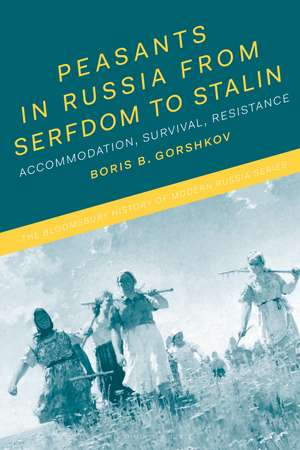Peasants in Russia from Serfdom to Stalin: Accommodation, Survival, Resistance: The Bloomsbury History of Modern Russia Series
Autor Dr Boris B. Gorshkoven Limba Engleză Paperback – 21 aug 2019
| Toate formatele și edițiile | Preț | Express |
|---|---|---|
| Paperback (1) | 231.06 lei 6-8 săpt. | |
| Bloomsbury Publishing – 21 aug 2019 | 231.06 lei 6-8 săpt. | |
| Hardback (1) | 715.50 lei 6-8 săpt. | |
| Bloomsbury Publishing – 7 feb 2018 | 715.50 lei 6-8 săpt. |
Preț: 231.06 lei
Preț vechi: 297.21 lei
-22% Nou
Puncte Express: 347
Preț estimativ în valută:
44.21€ • 47.28$ • 36.86£
44.21€ • 47.28$ • 36.86£
Carte tipărită la comandă
Livrare economică 17 aprilie-01 mai
Preluare comenzi: 021 569.72.76
Specificații
ISBN-13: 9781350126381
ISBN-10: 1350126381
Pagini: 256
Ilustrații: 20 bw illus
Dimensiuni: 156 x 234 x 17 mm
Greutate: 0.36 kg
Editura: Bloomsbury Publishing
Colecția Bloomsbury Academic
Seria The Bloomsbury History of Modern Russia Series
Locul publicării:London, United Kingdom
ISBN-10: 1350126381
Pagini: 256
Ilustrații: 20 bw illus
Dimensiuni: 156 x 234 x 17 mm
Greutate: 0.36 kg
Editura: Bloomsbury Publishing
Colecția Bloomsbury Academic
Seria The Bloomsbury History of Modern Russia Series
Locul publicării:London, United Kingdom
Caracteristici
Stresses the central importance of peasant ecology in understanding the Russian peasantry as part of an original interpretation
Notă biografică
Boris B Gorshkov is Visiting Assistant Professor of History at Kennesaw State University, USA. He is the author of Russia's Factory Children, Society, and the State: Childhood, Apprenticeship and Law, 1800-1917 (2009) and A Life under Russian Serfdom: Memoirs of Savva Dmitrievich Purlevskii, 1800-68 (2005).
Cuprins
List of FiguresList of TablesAcknowledgementsAuthor's PrefaceIntroduction: Institutional, Historiographical and Conceptual Framework 1. A Life under Russian Serfdom: Peasant Society and Politics under Serfdom 2. Peasant Agriculture3. Peasants, Childhood and Gender roles4. The Field and the Loom: Peasant Economy 5. Peasants and Russia's Early Industrialization 6. The Peasant and the Formation of Industrial Labor Forces 7. From Peasant to Industrialist: Social Mobility of the Peasantry 8. Peasant Public Sphere 9. Peasants and the End of Serfdom 10. Post-Emancipation Peasant Economy and Society 11. Peasants and the Russian Revolutions 12. Realpolitik: From the Red Terror to the New Economic Policy 13. Peasant Life during Collectivization Afterword: Demise of the Russian Peasantry BibliographyIndex
Recenzii
[An] excellent introductory read, often presented in a lively fashion, and demonstrating a remarkable ability to succinctly describe what were sometimes enormously complicated processes or developments . All in all, the portrait of daily life, micro-economic practices, family relations, and childhood, is vivid and persuasive. The author should be congratulated for undertaking such a bold enterprise and daring to challenge the standards of quibbling academics in order to reach a wider audience.
[A] truly laudable achievement in the academic literature on the Russian peasantry. Gorshkov's comprehensive yet brief and readable survey of this profoundly complex topic provides a brilliant introduction for the lay reader and an instructive summary for the specialist. This book should be considered a necessary resource for any course or study on modern Russian history or society.
[Gorshkov] makes a very strong case that non-agricultural labour was not just an add-on to the peasant economy, but an intrinsic part of it ... [there is] overall value of his study.
Gorshkov's approach [to the Russian peasantry], which cuts through older stereotypes, is a real strength of this book.
In this engrossing book, Boris Gorshkov provides both an accessible introduction to peasant culture and the village economy and a sweeping history of the countryside during the crucial period when peasants grappled with economic and political revolutions that transformed their lifestyle. For readers interested in modern Russian history, this book is a perfect place to start.
[A] truly laudable achievement in the academic literature on the Russian peasantry. Gorshkov's comprehensive yet brief and readable survey of this profoundly complex topic provides a brilliant introduction for the lay reader and an instructive summary for the specialist. This book should be considered a necessary resource for any course or study on modern Russian history or society.
[Gorshkov] makes a very strong case that non-agricultural labour was not just an add-on to the peasant economy, but an intrinsic part of it ... [there is] overall value of his study.
Gorshkov's approach [to the Russian peasantry], which cuts through older stereotypes, is a real strength of this book.
In this engrossing book, Boris Gorshkov provides both an accessible introduction to peasant culture and the village economy and a sweeping history of the countryside during the crucial period when peasants grappled with economic and political revolutions that transformed their lifestyle. For readers interested in modern Russian history, this book is a perfect place to start.











